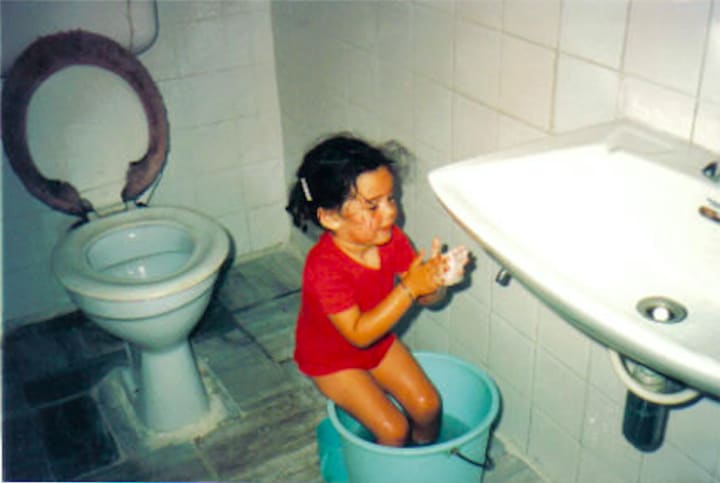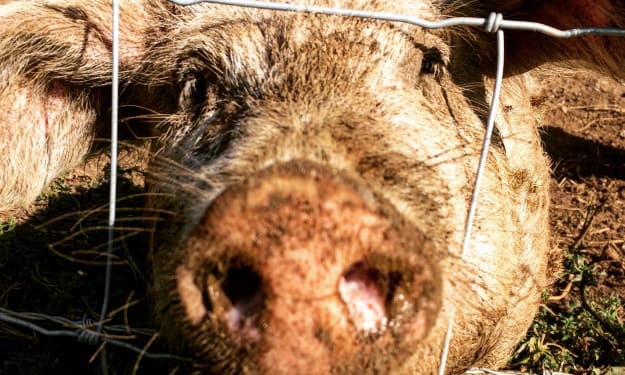Implicit Associations
The Beliefs and Prejudices We've Grown Up With

Last year, I completed my second course in play therapy—a type of counseling for children in which they express themselves autonomously through play. These courses, and the journey that led me to them, have been pivotal for me in terms of the person I am and the person I want to be. They made me confront and assess parts of me that it’s likely I would never have come into contact with otherwise.
One of the exercises that fundamentally changed my outlook on life was during our session about ‘Difference and Diversity’.
We were asked to imagine our “worst case scenario” when meeting a new client for the first time, the idea being to face into our internalised fears and prejudices. According to my journal entry, mine was: “a physically large teenage boy with a different ethnicity or cultural background (black sprung to mind) displaying violent or non-compliant behaviours and with negative views on women.”
It was uncomfortable to admit that, actually, the stereotypes—exacerbated continuously by the media and my predominantly white upbringing—had wormed their way into my being. Despite my perception of myself being that I was almost unerringly open-minded and not to mention the fact that my own heritage is mixed: my father is Indian.

My discomfort was made even worse when I went home and completed both my reading tasks and an Implicit Associations Test: an online questionnaire designed by Harvard University to “report attitudes towards and beliefs about” certain topics. Including, topics like race. My test results said that I had a “strong” affinity to Europeans over black people.
My response to my course reading (an excerpt from Race, Culture and Counselling: the Ongoing Challenge by Val Watson and Colin Lago) that week just compounded it. My main understanding of the text we were given was threefold:
- Western society is reluctant to acknowledge race. Often, white people do not see themselves as having a race and in order for assumptions and prejudices to be acknowledged the privileges that come with being white must first be realised.
- White people generally have a lack of drive to explore their own privilege.
- Meaningful discussions about race between white and black people are often deflected from the real issues by white people wanting to confront and absolve their guilt.
Understanding this was so important and it completely changed the way I thought about race.
Before I allowed myself to go there, I carried a ‘Black Lives Matter’ banner at a march but also thought that the ‘Black’ was interchangeable with ‘All’.
I’m not saying I get it right all the time now, but without acknowledging this implicit association I was always going to get it wrong. Coming face to face with my internalised beliefs and prejudices was the first step towards changing my own behaviour and I believe that's a universal truth because without changing as individuals we will never grow and collectively.

And, the thing that I’ve realised? These implicit beliefs are not our fault. They are drummed into us every minute of our lives from the moment we are born: our personality, and perhaps even our future, is defined by the gender roles we fall into the minute our genitalia is recognised. We eat animals because humans have always perceived themselves as being superior to other species and the colour of our skin affects the opportunities we enjoy whether we like it or not.
These are just facts. That doesn't mean we are individually aware of them though.
And, once we are aware, what we do about them is unwritten.
What if men were to start acknowledging that, actually, their gender does equate to a level of privilege that women have never consistently or popularly been privy to? What if humans as a species started to look at other animals and, in the absence of language, stop ignoring their obvious suffering? And, what if white people faced into the fact that society is set up in a way that means their skin colour gives them a head start?
These things are so ingrained in our culture that any move towards equality is spouted as misogyny, stupidity, weakness, or reverse racism.
And, theses privileges? They don’t mean you live a life that is hardship-free. It just means that your journey through life is a little less difficult and, likely, you are lucky enough to not have to even think about your gender or the colour of your skin or your sexual orientation, because you don’t have to. Because it’s the norm and society is set up for you.
For me, it’s not been easy. Confronting my implicit racism—which is what it is—was incredibly tough and I definitely fell (and possibly still fall) into the “white guilt” trap. But my guilt is not there to be absolved. It isn’t about me. The issue is the very real implications of implicit beliefs on minorities. What I try and do now is ask questions and actually listen and try to understand. And, if I don’t understand I try not to pretend I do. I follow more minority voices on social media and I try to confront my prejudices as and when they arise.
Now, when I’m talking to men about feminism I try and get them to understand why they too need to listen and not discount the experiences of women by countering with, “But… not ALL men,” or, “I’m not a feminist, I believe in equality; I’m a humanist.” Women’s experiences at the hands of a patriarchal society are all too real. Furthermore, even if the current generation of men is having to suddenly be more wary of their conduct, well, sorry guys but this doesn’t equate to “reverse sexism.” Having to deal with a critical eye being cast over your ‘locker room talk’ or being called out for objectifying women doesn't scratch the surface of the constraints that women have dealt with since antiquity. You have to watch your tongue when talking to women? Well shit. At least you don't have all-female governments making decisions about what's best for you and your bodies. At least you get condoms for free; women still have to pay for period supplies and damn, periods are definitely more difficult to abstain from than sex.
Sadly, speciesism is a whole other ball game. How do we get humans—who think they’re biologically superior to other animals—to admit they’re no more special than the animals they exploit? There I'm stumped.
Regardless. The buck stops with me and with you. Rather than shouting them down, listen to the people around you. Observe yourself, your responses, and your behaviour to them and their words. Notice when you are arguing with someone’s lived experience, especially if that someone is different to you in some way. Which, really, is everybody. Be aware of the guilt as it rises in you. And then? Then turn into it. Learn from it. Feel the discomfort that the implicit privilege you are used to—and that isn’t any fault of your own—creates and then sit with it. Explore it. Explore how it drives you and your thoughts. And then see what happens.
Acknowledging my implicit associations was the first, and hardest, step. Why not step out of your comfort zone too?
About the Creator
Munjeeta Sohal
I suffer from wonderlust 🤯
Reader 📚 writer 📝 truth-seeker 👁 traveller 🚀 foodie 🌶 (over) thinker 🤯 vegan 🌱 feminist 💪🏼 t1 diabetic 💉 teacher 👩🏻🏫 sun-worshipper 🌞
Head-butting my way through life 🐑






Comments
There are no comments for this story
Be the first to respond and start the conversation.